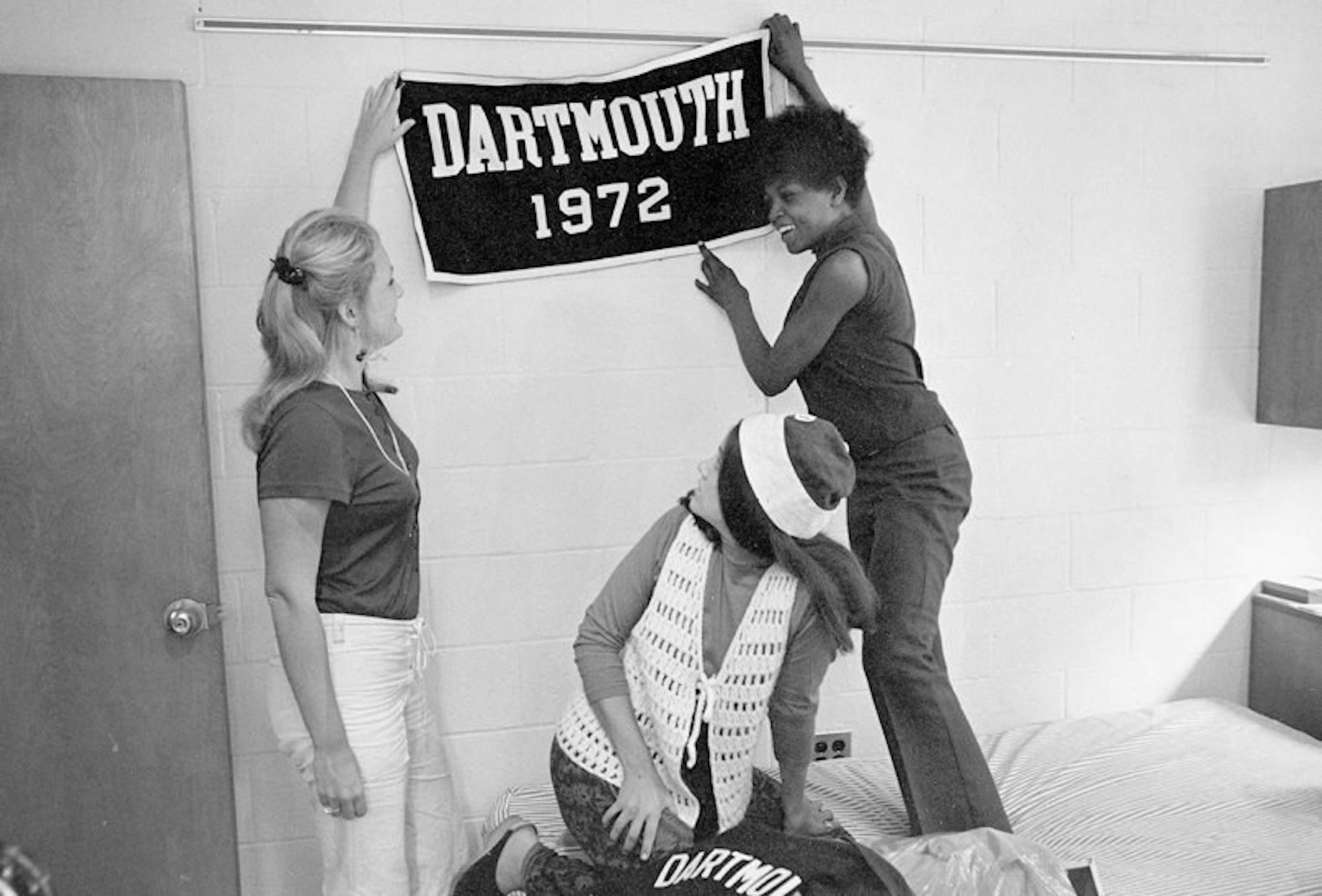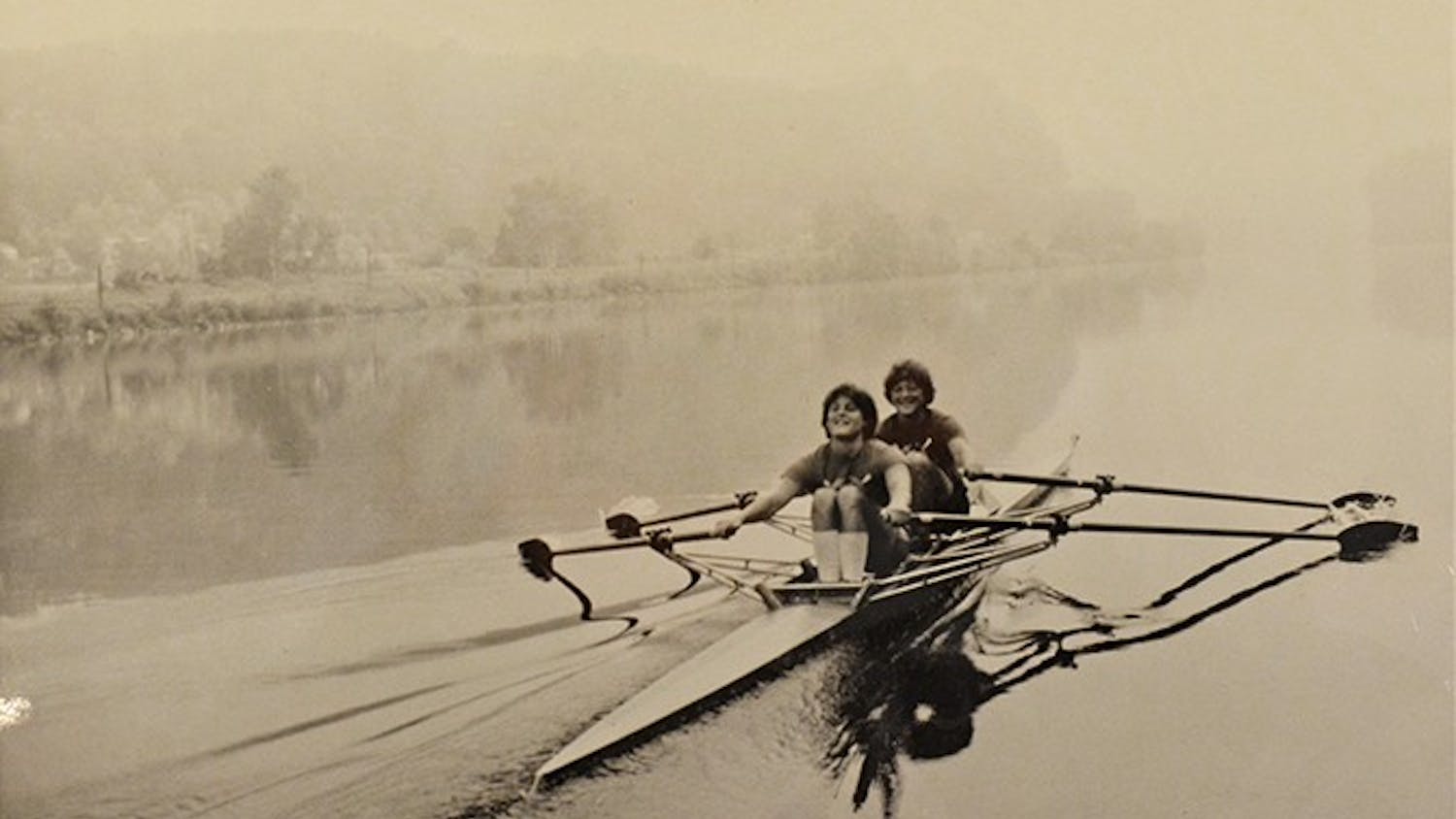It is not a well-known fact that Dartmouth hosted a small cohort of women exchange students starting in 1968 before its official inception as a coeducational institution in the fall of 1972. In recent years, Dartmouth has nearly equal numbers of women and men, a norm that is in part due to these trailblazers who made the first incursions onto Dartmouth’s all-male campus and shaped Dartmouth into the school it is today.
Last Friday at 4 p.m. in Filene Auditorium, the documentary “Early Daughters of Dartmouth — Blazing the Trail to Coeducation” premiered to a full crowd. The film, which is composed of interviews with the female exchange students, details the stories and experiences of the first women to enroll at Dartmouth.
The energy in the room was palpable as alumni—many of whom attended the College during the time period in which the film focuses—anticipated the screening. Producer and director Bill Aydelott ’72 talked about the hectic road to the premiere, citing last-minute 3 a.m. edits to accommodate the last-minute addition of Connie Britton ’89’s voiceover.
In spite of the frenzied production process, Aydelott expressed satisfaction with finally screening the film to the public.
“You get very close to a project of this nature, so you almost lose some of your perspective on how certain things are going to play,” Aydelott said. “But I was very gratified that the audience reacted at the right places. They laughed when I was looking to get a chuckle, and frankly at the end, there was quite a bit of emotion. It was emotional for me.”
Aydelott said he felt comfortable being critical of the College as the film was funded independently. According to executive producer Katherine Rines ’71, around $30,000 was raised from private donations given by female and male students from the classes of 1969, 1970, 1971, 1972 and the Leslie Center for the Humanities.
In 1968, Rines said, seven women enrolled at Dartmouth through the theater department, which asked the administration to ease the burden of looking to Hanover residents to fill the female roles in theater productions. The succeeding two years saw 75 female students enrolled at Dartmouth — a number that jumped to 150 women in the year preceding Dartmouth’s move to coeducation.
Overwhelmingly, the women in the film expressed positive and loving recollections of their time at Dartmouth. Many said they felt like full members of the community. Joan Rachlin ’71, who participated in the exchange program, described her experience at Dartmouth as one that was undeniably memorable.
“It was overall extraordinary,” she said. “And within that very broad umbrella there were times that were terrifying, times that were challenging, times that were a little crazy-making and certainly times that were absolutely the stuff of which the peak adventures in life were made.”
Despite the fond memories these women associate with their Dartmouth experiences, they also mentioned the incessant pressure to succeed on behalf of their gender.
“I understood full well my role as a guinea pig in the fact that if we did anything wrong, we could hurt the whole case for coeducation,” Rachlin said. “We were the crucible on which coeducation was going to be judged.”
In addition to the stress of representing women to encourage the College to consider coeducation, these students were navigating the minefield that was being one of few women on a campus traditionally dominated by men.
According to Rines, although she felt accepted by the campus, she at times felt alienated by students and alumni who strongly believed that Dartmouth should remain an all-male institution.
“You never knew what you were going to get when you walked across that Green,” Rines said. “This really young kid walked towards me very purposefully. I thought, ‘Oh, he’s going to say “Welcome.”’ And then he just looked at me and he said, ‘Why are you ruining my school?’”
The film describes how the social scene on weekends was difficult for the exchange students, as the men brought up dates from all-girls colleges. One of the only black exchange students said that the men of the African American Society asked the other black exchange students and her to cook dinner for their dates. The exchange students’ account of the enthusiastic “no” she and her friends gave the men was recalled with both disbelief and glee.
Rines said she felt that certain areas of campus offered welcome respite from the constant surveillance by male students and alumni.
“You just carved out your friendships in welcoming areas,” Rines said.
It is this sentimental yet complicated affection that makes the distance Dartmouth kept from its first class of women all the more saddening, according to Rines.
The women who were interviewed in the film loved Dartmouth; many cited their exchange terms at the school as some of the happiest, most formative times in their lives, but the College severed ties with them once their time on campus ended.
One woman in the film quipped about her surprise that the College’s alumni network had found her by saying, “Not even my college boyfriend could find me!”
The last scene of the film features an exchange student recounting the following story: She recently walked up to a current male Dartmouth student and asked, “Did you know that Dartmouth used to be single-sex?” The current student replied, “No!” The exchange student then humorously said, “Can you believe it took Dartmouth so long to admit men?”
The film pieces together parts of a story that had been buried in time and memory. For Rines, the film was an opportunity to paint a picture of her time at Dartmouth.
“To see the whole story told in a linear fashion was really exciting,” Rachlin said. “In a sense, the film was reclaiming our role in coeducation or at least shining a light on it, which had never been shown before.”
Rachlin also said she sees the film as a necessary artifact of Dartmouth history.
It is appropriate that such a film was a part of the College’s Homecoming weekend activities and was listed on Dartmouth’s official online schedule because the film marks the first real push to illuminate the stories of these trailblazing women. By having their stories told in the film, the women can finally come home to Dartmouth as recognized members of our collective history.



